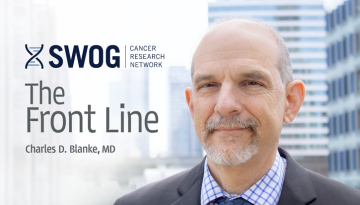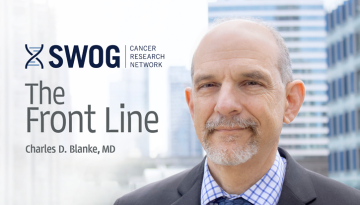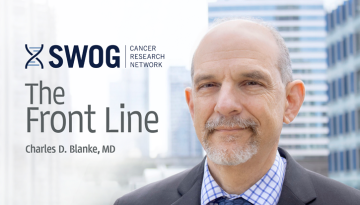ESI Training Course 2023: Full Steam Ahead
The COVID-19 pandemic disrupted many aspects of clinical oncology research, and perhaps no one in the field felt the stress of these disruptions as acutely as investigators in the early stages of their careers, as funding and professional development opportunities dried up or were delayed. Not to mention potential mentors dealing with their own issues!
For SWOG, this resulted in our making the 2020 Early-Stage Investigator Training Course (then known as the Young Investigator Training Course – typically a mix of online educational opportunities culminating in an intensive three-day face-to-face workshop) an entirely online clinic.
It became clear that year that the intensive mentoring at the heart of the workshop is difficult to achieve in a purely virtual setting, so in 2021 we decided we would postpone the workshop portion of the course until we could schedule it face to face – it was that important! Unfortunately, repeated surges of the virus delayed thatface-to-face experience until well into 2022, leading us to cancel our 2022 application cycle.
Today, I’m truly delighted to be able to report – given that the 2023 ESITC program was not canceled – that our reviewers have just selected the applicants who will be members of the ESITC class of 2023:
- Arathi Mohan, MD
Clinical assistant professor, University of Michigan
“A multi-center phase II study of camonsertib plus olaparib for patients with IDH1 or IDH2 mutated advanced biliary tract cancer” - Taiane Rebelatto, MD
Medical director, Latin American Cooperative Oncology Group (LACOG)
“A single-arm phase II trial of datopotamab deruxtecan (Dato-Dxd) plus durvalumab as first line treatment for patients with advanced/metastatic penile cancer” - Rachael Safyan, MD
Assistant professor, University of Washington and Fred Hutchinson Cancer Center
“Randomized phase II study of second-line chemotherapy with or without panitumumab for metastatic KRAS wild-type pancreatic adenocarcinoma” - Jonathan Sham, MD, MBEE
Assistant professor of surgery, University of Washington and Fred Hutchinson Cancer Center
“A randomized multicenter trial of lanreotide for the prevention of postoperative pancreatic fistulae”
I’ve written before (more than once) about the outsized impact of the ESITC – the clinical trials, publications, SWOG leaders, changes in medical practice, new standards of care, and ultimately, the improved and lengthened patient lives that have resulted from this program. So the fact that we have our first new ESITC cohort in two years is worth calling attention to.
We will convene with these four colleagues in mid-September in Seattle for an intensive, three-day, face-to-face workshop in protocol development, trial management, and statistical analysis, taught by some of the best of the best in these areas.
Our Early-Stage Investigator Training Course is fully supported by The Hope Foundation for Cancer Research, which also offers several other programs targeted to clinical oncology researchers in the early stages of their career.
Hope’s two newest grants in this category are the NCORP Early-Stage Investigator Travel Funds program, which supports group meeting travel and a networking reception for investigators representing our NCORP sites and research priorities, and the Nicholas Vogelzang SWOG GU Scholarship, which similarly funds group meeting travel and pairs recipients with mentors.
I encourage early-career researchers to explore Hope’s other programs as well, including their Virtual Grant Writing Workshop and the Dr. Charles A. Coltman, Jr., Fellowship. I’ll also recommend my earlier column on ways in which early career investigators can get involved in SWOG’s work.
Next year will mark a quarter century for our flagship ESITC program, which has to date graduated well over 100 SWOG researchers. Make note of the four newest names on this list above. If past experience is any guide, you’re likely to hear them again (and again and again) in the years to come.
________________________________________________________________
Trial of the Week
S1922: Randomized phase II selection study of ramucirumab and paclitaxel versus FOLFIRI in refractory small bowel adenocarcinoma
I wrote above about oncology researchers hit particularly hard by the advent of COVID-19. S1922’s PI, Dr. Michael Overman, of the MD Anderson Cancer Center, should be on that list. He activated this trial in December of 2019, the waning hours of the pre-pandemic era. The enrollment of the study’s first patient was delayed until June of 2020, and accrual has never quite recovered.
About 4,000 cases of small bowel adenocarcinoma (SBA) are diagnosed each year in the United States. Clinical management of the disease is usually extrapolated from regimens used for colon cancer, although there’s plenty of evidence that SBA is genomically distinct.
Only seven prospective clinical trials – all small studies – have been conducted in this disease, and five of those were in the front-line setting. Clearly, we need data on the most effective treatments for SBA in the second-line – and later – setting.
We are enrolling not even one patient per month to S1922 currently. The earlier ZEBRA trial (at 40 patients, the largest ever conducted in SBA) enrolled an average of almost three patients per month from this same population, so we know we can do better, especially given that more than 400 sites have opened this study.
The three institutions leading accrual to S1922 are
- MD Anderson Cancer Center
- Washington University School of Medicine
- University of Michigan Comprehensive Cancer Center
When you see patients with previously treated metastatic or locally advanced small bowel adenocarcinoma, please consider whether they would be appropriate candidates for S1922.
Learn more on the SWOG S1922 page or the CTSU S1922 page.
Other Recent Stories



